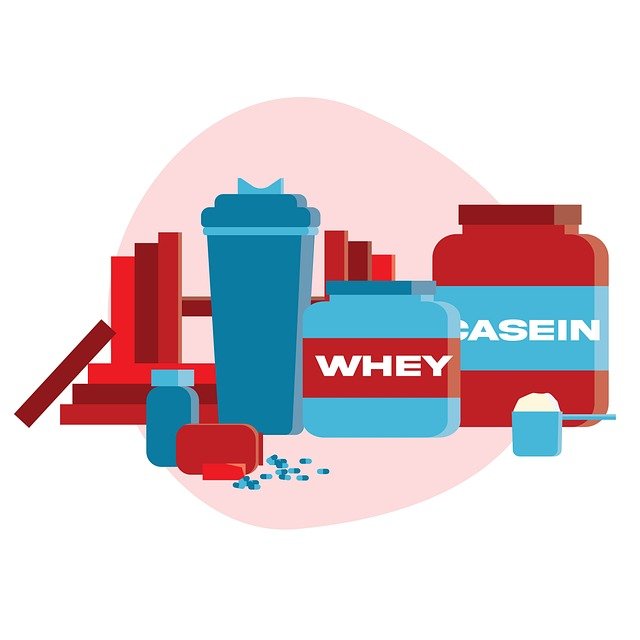Protein powder and meal replacement shakes have gained immense popularity in recent years as individuals strive to meet their nutritional requirements conveniently and effectively. Protein is crucial in a healthy diet, aiding in muscle growth, repair, and overall well-being.
In this article, we will delve into the differences between protein powder and meal replacement shakes, exploring their benefits and potential drawbacks to help you decide which option suits your needs best.
Protein Powder
Protein powder is a concentrated source of protein derived from various sources, such as whey, casein, soy, or pea. It typically comes in powdered form and can be easily mixed with a pre workout shaker, water, milk, or other liquids. Protein powder offers several advantages
Muscle growth and recovery: Protein powder provides essential amino acids aiding muscle repair and growth, making it popular among athletes and fitness enthusiasts.
A convenient source of protein: With busy schedules, consuming enough protein from whole foods alone can be challenging. Protein powder offers a quick and convenient way to supplement your protein intake.
Versatility in usage: Protein powder can be incorporated into various recipes, such as smoothies, protein bars, or even baked goods, making it adaptable to individual preferences.
However, it is essential to consider the potential drawbacks associated with protein powder:
Possible digestive issues: Some individuals may experience digestive discomfort, such as bloating or gas when consuming protein powder. It is important to listen to your body and adjust your intake accordingly.
Quality and purity concerns: Not all protein powders are created equal. Ensuring you choose a reputable brand that undergoes rigorous testing for quality and purity is crucial.
Lack of other essential nutrients: While protein powder provides a concentrated source of protein, it may not contain other essential nutrients found in whole foods, such as fiber, vitamins, and minerals.
Meal Replacement Shakes
Meal replacement shakes are pre-packaged beverages designed to provide a balanced and convenient meal alternative. They typically contain a mix of protein, carbohydrates, fats, vitamins, and minerals, aiming to offer a complete and nutritionally sound meal replacement option. Here are some advantages of meal replacement shakes:
Convenient and time-saving option: Meal replacement shakes are a quick and hassle-free solution for individuals with busy lifestyles or those on the go.
Balanced nutrition: These shakes are formulated to provide a well-rounded meal, ensuring adequate amounts of protein, carbohydrates, fats, and essential micronutrients.
Portion control and calorie management: With pre-portioned servings, meal replacement shakes help manage calorie intake and promote weight management.
When considering meal replacement shakes, there are a few key factors to consider:
Ingredients and nutritional content: Read labels carefully and opt for shakes that contain high-quality ingredients and a balanced macronutrient profile.
Sugar and artificial additives: Be mindful of added sugars, artificial sweeteners, and unnecessary additives. Choose shakes with minimal added sugars or opt for natural sweeteners.
Allergens and dietary restrictions: If you have specific dietary requirements or food allergies, ensure the meal replacement shake aligns with your needs.
Protein Powder vs. Meal Replacement Shakes
Now let’s compare protein powder and meal replacement shakes to help you make an informed decision based on your goals and preferences.
Protein Content Comparison
Amount of protein per serving: Protein powder typically offers a higher protein concentration per serving than meal replacement shakes.
Absorption and bioavailability: Protein powder, especially whey protein, is known for its quick absorption and high bioavailability. On the other hand, meal replacement shakes may contain a blend of proteins with varying absorption rates, which can affect how quickly the body utilizes the protein.
Nutritional Profile Comparison
Macronutrients: While protein powder focuses primarily on protein content, meal replacement shakes provide a more comprehensive macronutrient profile, including carbohydrates and fats. This can be beneficial for individuals seeking a balanced meal replacement option.
Vitamins and minerals: Meal replacement shakes are often fortified with a range of vitamins and minerals, ensuring you receive diverse essential nutrients. Protein powder may not offer the same level of micronutrient supplementation.
Weight Management and Satiety
Calorie content and control: Meal replacement shakes are designed to provide a controlled calorie intake, making them suitable for individuals aiming to manage their weight. On the other hand, protein powder can be more flexible in adjusting calorie intake based on individual needs.
Feeling of fullness and hunger suppression: Meal replacement shakes, due to their balanced macronutrient composition and higher fiber content, may promote a greater feeling of fullness and help curb hunger compared to protein powder alone.
Usage and Versatility
Pre- and post-workout options: Protein powder is often favored as a quick and efficient option for post-workout recovery, thanks to its high protein content. Meal replacement shakes can serve as a convenient pre-workout or on-the-go meal option.
Meal replacement or supplement: Protein powder is primarily used as a supplement to enhance protein intake, while meal replacement shakes serve as a substitute for a complete meal.
Personal Goals and Preferences
Fitness goals: Consider your specific goals, such as muscle gain, weight loss, or weight maintenance. Protein powder may be preferred by individuals looking to increase muscle mass, while meal replacement shakes can aid in weight management or provide a convenient meal option.
Taste preferences and dietary needs: Both protein powder and meal replacement shakes come in various flavors and formulations. Consider your taste preferences and any dietary restrictions or allergies when choosing.
Conclusion
Choosing between protein powder and meal replacement shakes ultimately depends on your needs, goals, and preferences. Protein powder offers a concentrated protein source, convenience, and versatility but may lack other essential nutrients. Meal replacement shakes provide a balanced meal alternative, time-saving convenience, and support for weight management, but may contain lower protein content than protein powder.


























